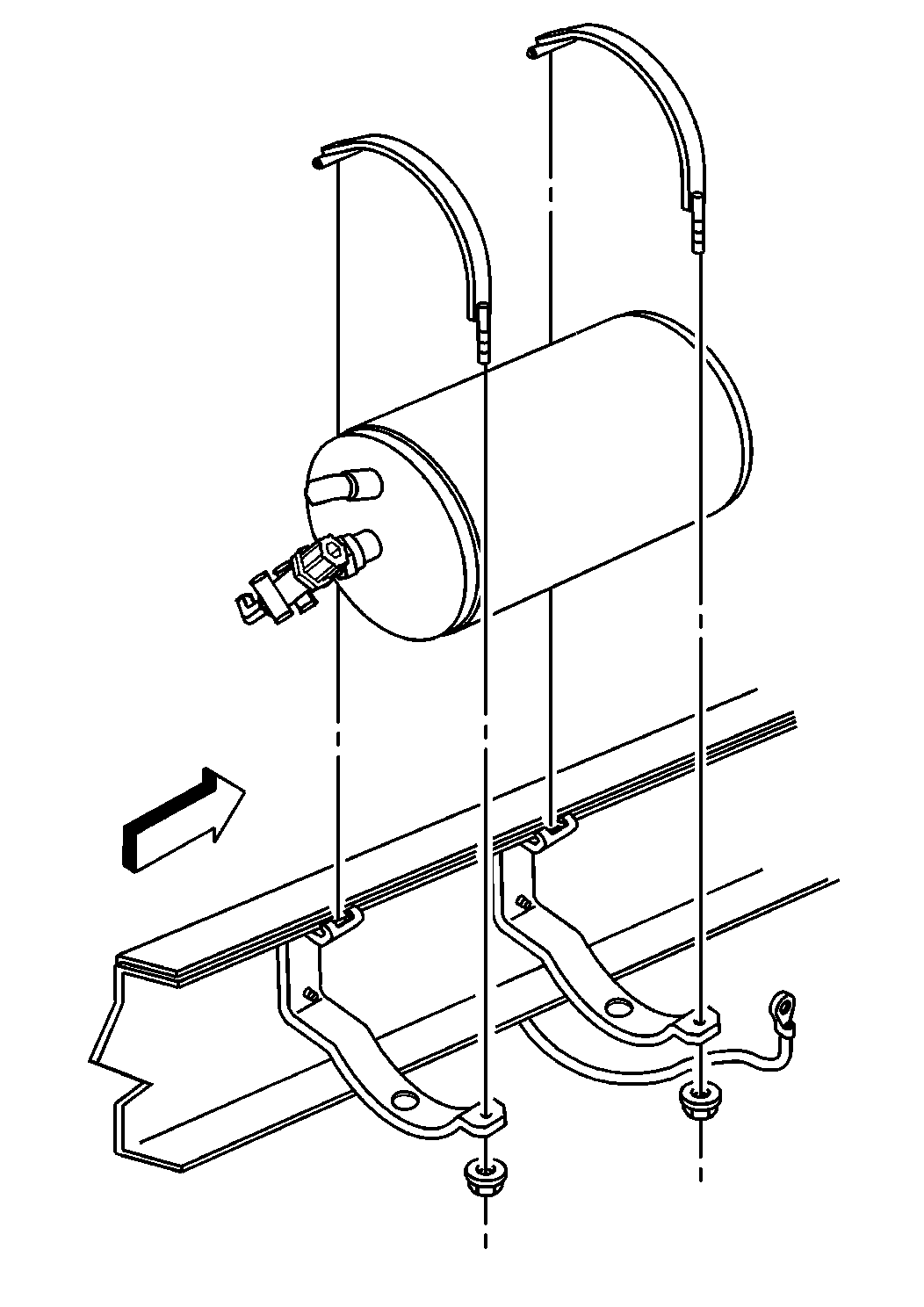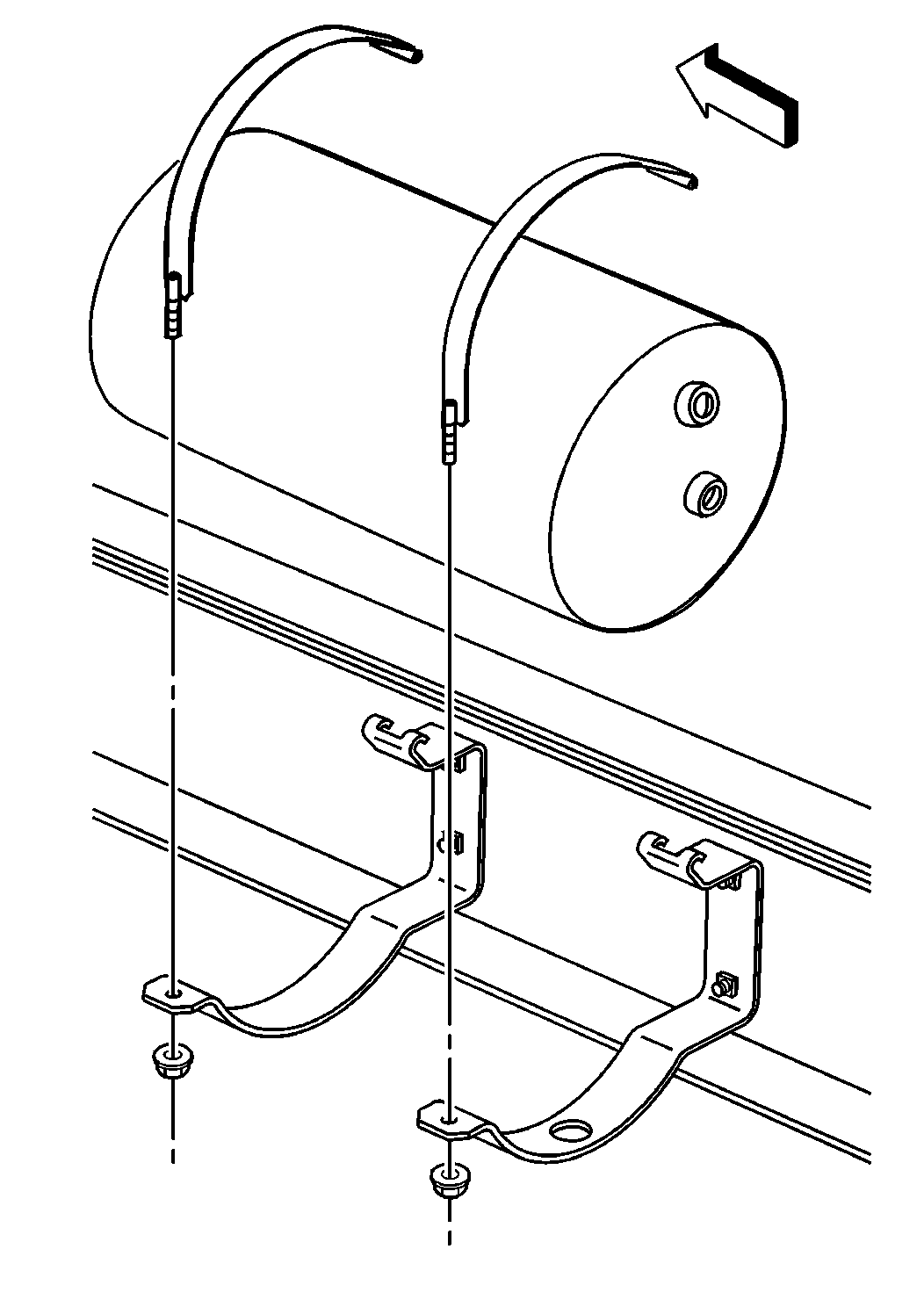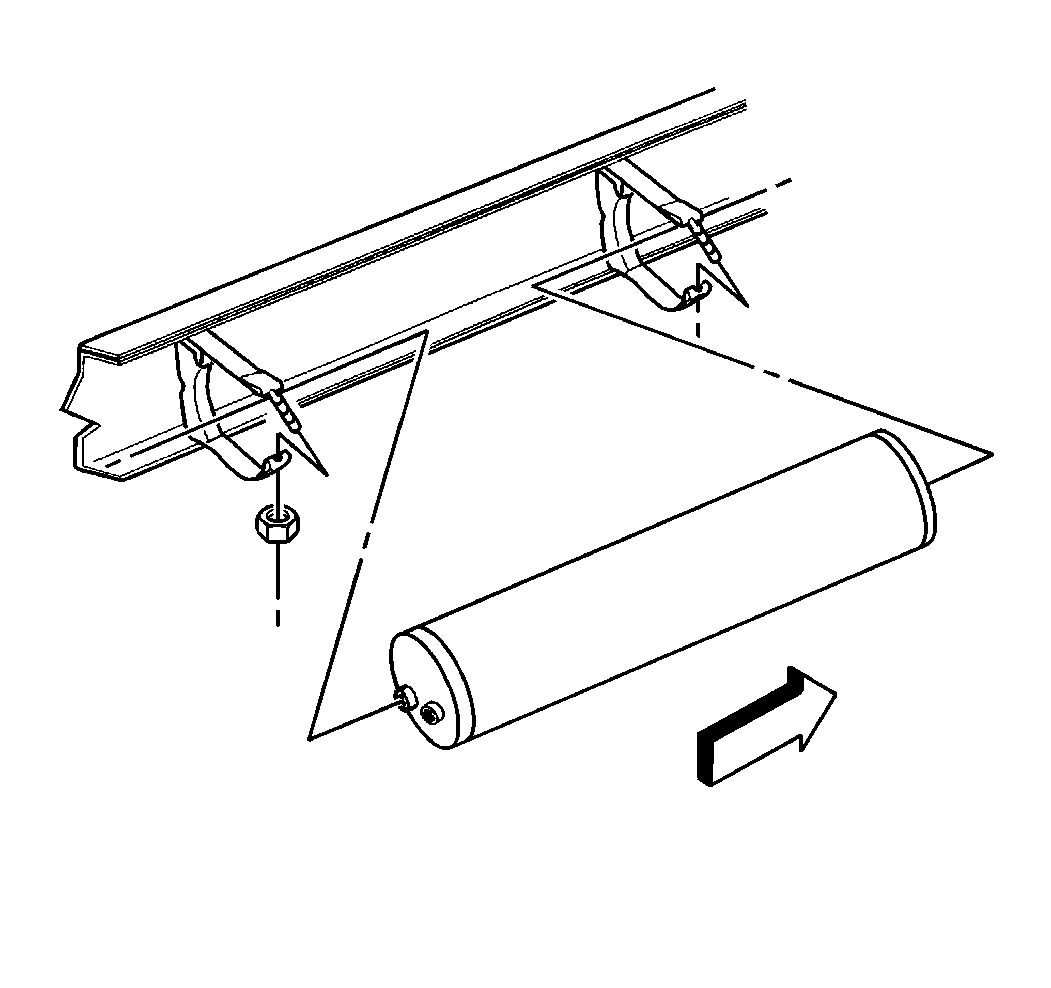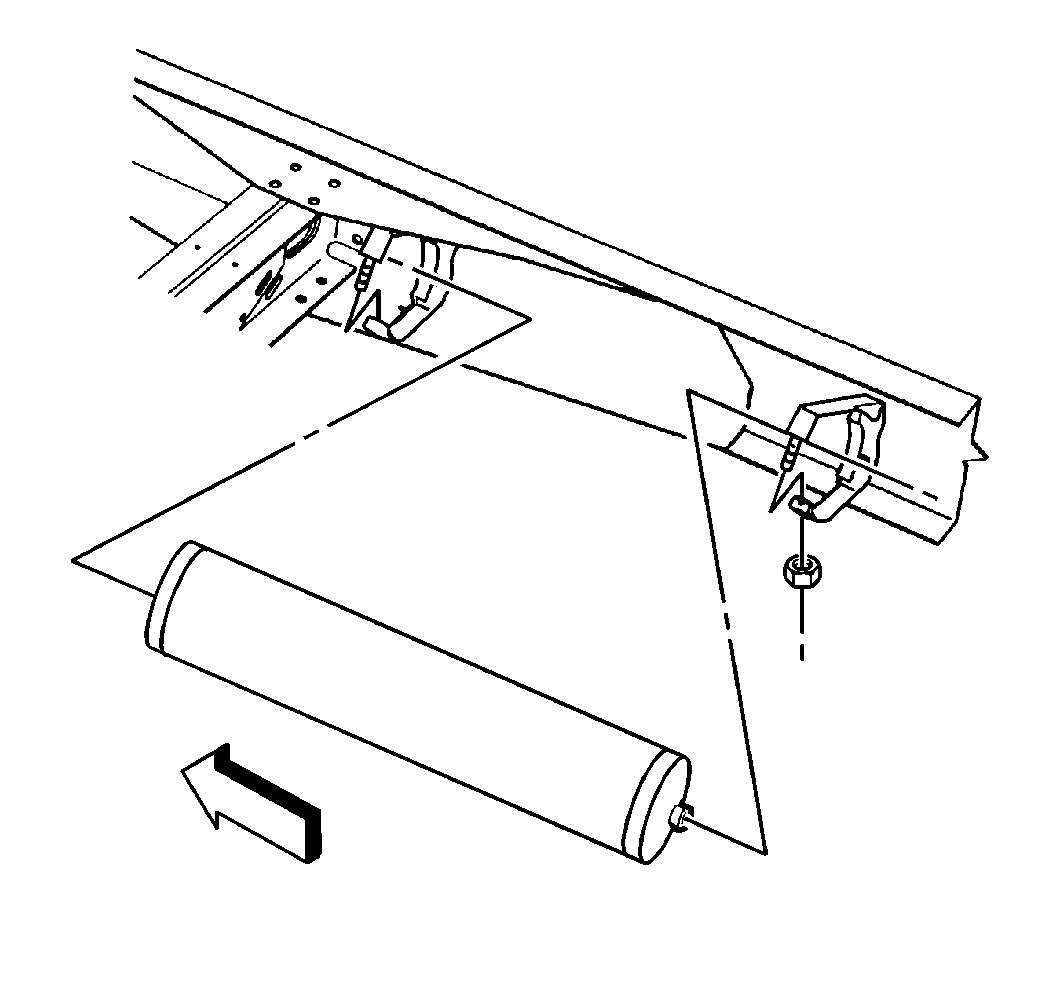Reservoir Replacement Front Axle
Removal Procedure
- Apply the parking brake.
- Block the wheels.
- Drain all the reservoirs. Refer to
Draining Reservoirs
.
- Remove the air lines. Refer to Hose and Line Replacement (Nylon and Metal Compression)
.

- Remove the reservoir support
strap nuts.
- Remove the reservoir support straps from the reservoir supports.
- Remove the reservoir.
- Clean the air lines and the fittings with a dry cloth.
- Clean the inside reservoir with steam or hot water.
- Inspect the air lines for the following conditions:
| • | If any of these conditions are present, replace the air lines. |
- Inspect the reservoir for corrosion or damage.
- Replace the reservoir if the reservoir is weakened.
- Check the reservoir supports and straps for damage.
- Replace the supports and the straps as needed.
Installation Procedure
- Install the reservoir.
- Install the reservoir support straps to the reservoir supports.

Notice: Use the correct fastener in the correct location. Replacement fasteners
must be the correct part number for that application. Fasteners requiring
replacement or fasteners requiring the use of thread locking compound or sealant
are identified in the service procedure. Do not use paints, lubricants, or
corrosion inhibitors on fasteners or fastener joint surfaces unless specified.
These coatings affect fastener torque and joint clamping force and may damage
the fastener. Use the correct tightening sequence and specifications when
installing fasteners in order to avoid damage to parts and systems.
- Install the reservoir
support strap nuts.
Tighten
Tighten the front axle service reservoir support strap nuts to 12 N·m
(106 lb ft).
- Install the air lines. Refer to Hose and Line Replacement (Nylon and Metal Compression)
.
- Start the engine.
- Charge the system air pressure to the governor cut-out point.
- Stop the engine.
- Check for leaks with a soap solution.
- Leakage is not permissible.
- Check for the proper brake operation.
- Remove the wheel blocks.
Reservoir Replacement Primary Air Brake
Removal Procedure
- Apply the parking brake.
- Block the wheels.
- Drain all the reservoirs. Refer to
Draining Reservoirs
.
- Remove the air lines. Refer to Hose and Line Replacement (Nylon and Metal Compression)
.

- Remove the reservoir support
strap nuts.
- Remove the reservoir support straps from the reservoir supports.
- Remove the reservoir.
- Clean the air lines and the fittings with a dry cloth.
- Clean the inside reservoir with steam or hot water.
- Inspect the air lines for the following conditions:
| • | If any of these conditions are present, replace the air lines. |
- Inspect the reservoir for corrosion or damage.
- Replace the reservoir if the reservoir is weakened.
- Check the reservoir supports and the straps for damage.
- Replace the supports and the straps as needed.
Installation Procedure
- Install the reservoir.
- Install the reservoir support straps to the reservoir supports.

Notice: Use the correct fastener in the correct location. Replacement fasteners
must be the correct part number for that application. Fasteners requiring
replacement or fasteners requiring the use of thread locking compound or sealant
are identified in the service procedure. Do not use paints, lubricants, or
corrosion inhibitors on fasteners or fastener joint surfaces unless specified.
These coatings affect fastener torque and joint clamping force and may damage
the fastener. Use the correct tightening sequence and specifications when
installing fasteners in order to avoid damage to parts and systems.
- Install the reservoir
support strap nuts.
Tighten
Tighten the primary air brake supply reservoir support strap nuts to
12 N·m (106 lb ft).
- Install the air lines. Refer to Hose and Line Replacement (Nylon and Metal Compression)
.
- Start the engine.
- Charge the system air pressure to the governor cut-out point.
- Stop the engine.
- Check for leaks with a soap solution.
- Leakage is not permissible.
- Check for proper brake operation.
- Remove the wheel blocks.
Reservoir Replacement Rear Axle -Front Unit
Removal Procedure
- Apply the parking brake.
- Block the wheels.
- Drain all the reservoirs. Refer to
Draining Reservoirs
.
- Remove the air lines. Refer to Hose and Line Replacement (Nylon and Metal Compression)
.

- Remove the reservoir support
strap nuts.
- Remove the reservoir support straps from the reservoir supports.
- Remove the reservoir.
- Clean the air lines and the fittings with a dry cloth.
- Clean the inside reservoir with steam or hot water.
- Inspect the air lines for the following conditions:
| • | If any of these conditions are present, replace the air lines. |
- Inspect the reservoir for corrosion or damage.
- Replace the reservoir if the reservoir is weakened.
- Check the reservoir supports and the straps for damage.
- Replace the supports and the straps as needed.
Installation Procedure
- Install the reservoir.
- Install the reservoir support straps to the reservoir supports.

Notice: Use the correct fastener in the correct location. Replacement fasteners
must be the correct part number for that application. Fasteners requiring
replacement or fasteners requiring the use of thread locking compound or sealant
are identified in the service procedure. Do not use paints, lubricants, or
corrosion inhibitors on fasteners or fastener joint surfaces unless specified.
These coatings affect fastener torque and joint clamping force and may damage
the fastener. Use the correct tightening sequence and specifications when
installing fasteners in order to avoid damage to parts and systems.
- Install the reservoir
support strap nuts.
Tighten
Tighten the rear axle service reservoir support strap (front unit) nuts
to 22 N·m (16 lb ft).
- Install the air lines.Refer to Hose and Line Replacement (Nylon and Metal Compression)
.
- Start the engine.
- Charge the system air pressure to the governor cut-out point.
- Stop the engine.
- Check for leaks with a soap solution.
- Leakage is not permissible.
- Check for proper brake operation.
- Remove the wheel blocks.
Reservoir Replacement Rear Axle -Rear Unit
Removal Procedure
- Apply the parking brake.
- Block the wheels.
- Drain all the reservoirs. Refer to
Draining Reservoirs
.
- Remove the air lines. Refer to Hose and Line Replacement (Nylon and Metal Compression)
.

- Remove the reservoir support
strap nuts.
- Remove the reservoir support straps from the reservoir supports.
- Remove the reservoir.
- Clean the air lines and the fittings with a dry cloth.
- Clean the inside reservoir with steam or hot water.
- Inspect the air lines for the following conditions:
| • | If any of these conditions are present, replace the air lines. |
- Inspect the reservoir for corrosion or damage.
- Replace the reservoir if the reservoir is weakened.
- Check the reservoir supports and the straps for damage.
- Replace the supports and the straps as needed.
Installation Procedure
- Install the reservoir.
- Install the reservoir support straps to the reservoir supports.

Notice: Use the correct fastener in the correct location. Replacement fasteners
must be the correct part number for that application. Fasteners requiring
replacement or fasteners requiring the use of thread locking compound or sealant
are identified in the service procedure. Do not use paints, lubricants, or
corrosion inhibitors on fasteners or fastener joint surfaces unless specified.
These coatings affect fastener torque and joint clamping force and may damage
the fastener. Use the correct tightening sequence and specifications when
installing fasteners in order to avoid damage to parts and systems.
- Install the reservoir
support strap nuts.
Tighten
Tighten the rear axle service reservoir support strap (rear unit) nuts
to 22 N·m (16 lb ft).
- Install the air lines.Refer to Hose and Line Replacement (Nylon and Metal Compression)
.
- Start the engine.
- Charge the system air pressure to the governor cut-out point.
- Stop the engine.
- Check for leaks with a soap solution.
- Leakage is not permissible.
- Check for proper brake operation.
- Remove the wheel blocks.








